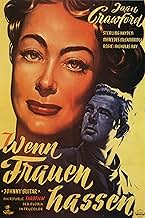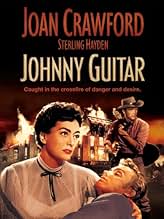AVALIAÇÃO DA IMDb
7,6/10
20 mil
SUA AVALIAÇÃO
Depois de ajudar um membro de uma gangue que foi ferido, uma dona de um bar é injustamente suspeita de assassinato e assalto a banco.Depois de ajudar um membro de uma gangue que foi ferido, uma dona de um bar é injustamente suspeita de assassinato e assalto a banco.Depois de ajudar um membro de uma gangue que foi ferido, uma dona de um bar é injustamente suspeita de assassinato e assalto a banco.
- Prêmios
- 1 vitória e 1 indicação no total
Trevor Bardette
- Jenks
- (não creditado)
George Bell
- Posseman
- (não creditado)
Bob Burrows
- Posseman
- (não creditado)
Curley Gibson
- Posseman
- (não creditado)
Chick Hannan
- Posseman
- (não creditado)
Enredo
Você sabia?
- CuriosidadesAt one point, Johnny says, "I'm a stranger here myself." This was Nicholas Ray's own personal motto, a recurring theme in his movies, and reportedly the working title for just about every movie he directed.
- Erros de gravaçãoAfter the bank robbery, Vienna and Johnny Guitar are riding along in a buggy drawn by a single horse. While the horse sounds like it is only trotting along, the scenery rushing past the buggy makes it appear the buggy is going at highway speed.
- ConexõesEdited into Bonanza: The Night Virginia City Died (1970)
Avaliação em destaque
Boy this is a jewel, and for many different reasons. A good lot of people deserve credit for their work
First is Nicholas Ray for his direction. A fine preparation and presentation of the visual elements really took some doing. The use, but not excessive glorification (thank goodness), of the relatively new Trucolor is well-done; the horses full of black-clad riders rushing up the rocky hill in the night, the many shots of the furious blazes dissolving Vienna's place, and so much more.
The acting is remarkable. Sterling Heyden, just in standing before the camera and delivering his lines in that firm and fearless manner (ala Asphalt Jungle), is a strong presence. John Carradine once again shows himself as the precious dramatist he proved himself to be many years before in The Grapes of Wrath.
What strikes me the most, though, is Ben Maddow's (thank Phillip Yordan for being an heroic front) screenplay. It is not only thick in theme and symbolism, it is thick with what was (at the time) almost unprecedented elements. Both Vienna and Emma are, as either GOOD or BAD, shown as the leaders of men! Pacifism is being shown as a good thing! Is that the good guys wearing black and the bad guys wearing white (or maybe the other way around)?! As many comments have mentioned, the Un-American Activities Committee parallels (complete with the entire Ox-Bow-esquire element) are, really, quite thinly veiled. The economically powerful, Small and McIver, are dominant and monopolistic capitalists (a version of antagonism almost unseen, for obvious reasons, since the McCarthey-assaulted Force of Evil). Remember, this is 1954!!!! This stuff is downright revolutionary! How did they ever get it all past the censors and masters of the code?
Let's hope time doesn't forget this one in favor of some formulaic shoot-'em-ups simply because they feature "the Duke."
First is Nicholas Ray for his direction. A fine preparation and presentation of the visual elements really took some doing. The use, but not excessive glorification (thank goodness), of the relatively new Trucolor is well-done; the horses full of black-clad riders rushing up the rocky hill in the night, the many shots of the furious blazes dissolving Vienna's place, and so much more.
The acting is remarkable. Sterling Heyden, just in standing before the camera and delivering his lines in that firm and fearless manner (ala Asphalt Jungle), is a strong presence. John Carradine once again shows himself as the precious dramatist he proved himself to be many years before in The Grapes of Wrath.
What strikes me the most, though, is Ben Maddow's (thank Phillip Yordan for being an heroic front) screenplay. It is not only thick in theme and symbolism, it is thick with what was (at the time) almost unprecedented elements. Both Vienna and Emma are, as either GOOD or BAD, shown as the leaders of men! Pacifism is being shown as a good thing! Is that the good guys wearing black and the bad guys wearing white (or maybe the other way around)?! As many comments have mentioned, the Un-American Activities Committee parallels (complete with the entire Ox-Bow-esquire element) are, really, quite thinly veiled. The economically powerful, Small and McIver, are dominant and monopolistic capitalists (a version of antagonism almost unseen, for obvious reasons, since the McCarthey-assaulted Force of Evil). Remember, this is 1954!!!! This stuff is downright revolutionary! How did they ever get it all past the censors and masters of the code?
Let's hope time doesn't forget this one in favor of some formulaic shoot-'em-ups simply because they feature "the Duke."
- robveal
- 26 de jan. de 2008
- Link permanente
Principais escolhas
Faça login para avaliar e ver a lista de recomendações personalizadas
- How long is Johnny Guitar?Fornecido pela Alexa
Detalhes
- Data de lançamento
- País de origem
- Idioma
- Também conhecido como
- Johnny Guitar - Gejagt, gehaßt, gefürchtet
- Locações de filme
- Empresa de produção
- Consulte mais créditos da empresa na IMDbPro
Bilheteria
- Faturamento bruto mundial
- US$ 6.875
- Tempo de duração1 hora 50 minutos
- Cor
Contribua para esta página
Sugerir uma alteração ou adicionar conteúdo ausente

Principal brecha
By what name was Johnny Guitar (1954) officially released in India in English?
Responda

























